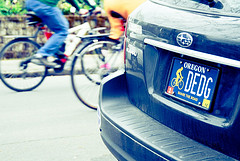The House Committee on Transportation has put forward a legislative concept (soon to become an official bill) that would direct the Oregon Department of Transportation to conduct a study on the feasibility of bicycling licensing.
The idea currently exists as Legislative Concept 1581 (LC 1581). According to the LC draft language (PDF here), if passed, the ODOT would conduct a study on, “the feasibility of issuing bicycle licenses to owners of bicycles.”
“… licensing system could work to the advantage of bicyclists by: (a) Using the licenses for tracing stolen or lost bicycles; (b) Using fees, if any, to fund bicycle infrastructure…”
The LC draft shows that perhaps the committee feels some sort of licensing system might be good for people who bike. Here’s an excerpt:
“The purpose of the study is to determine whether a voluntary or mandatory licensing system could work to the advantage of bicyclists by: (a) Using the licenses for tracing stolen or lost bicycles; (b) Using fees, if any, to fund bicycle infrastructure, such as bike paths, bicycle lanes or any improvements that would assist bicyclists in commuting to work; or (c) Allowing planners to determine the number of bicycles in a city or community and the need to plan for future needs.”
I think the idea might have some merit. If someone could figure out a fair and voluntary licensing system, it might be worth considering. Voluntary licensing might help thwart some of the anti-bike vitriol that stems from some people’s feelings that bicycle riders are above the law, unregulated, and don’t pay into the system like motor vehicles are required to do. Also, if the study shows licensing bikes simply doesn’t work, it might mean the end of this idea once and for all.
However, that bike licensing is even being considered is likely to make a lot of people in the community very concerned. It could open a Pandora’s Box: What if the study finds that mandatory licensing could work? What if lawmakers push for the idea as a way to raise revenue on the backs of a mode that currently subsidizes motor vehicles and that our state should be doing everything to encourage? What if this emboldens the “bikers need to pay their fair share!” argument?
It’s also not yet clear how much money the study would cost (which could make it a non-starter) or who and how exactly the study would be conducted. This could get interesting. Stay tuned for updates.
— More legislation coverage at our 2011 Legislative Session page.
Correction: This article originally stated that this bill was requested by Rep. Jules Bailey (D-Portland) but I have since learned from his office that it is not their bill. I have edited the story and regret the error.


